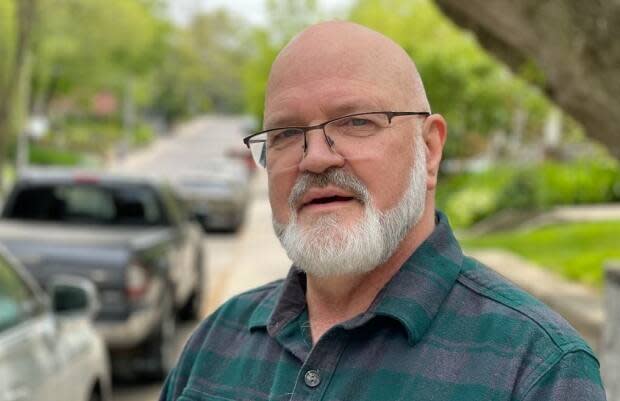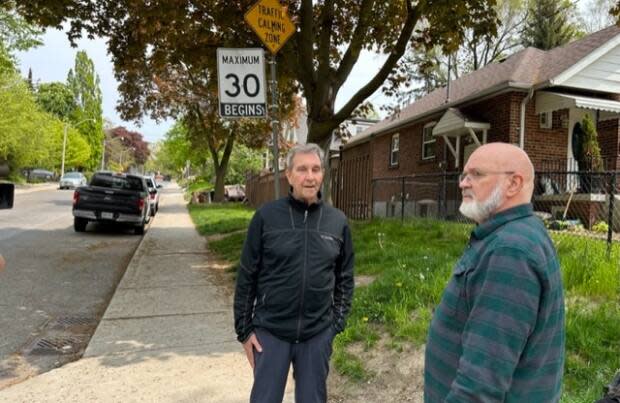Toronto's Beach residents push city council for U-turn on overnight parking ban

Scores of motorists in the parking-starved Beach area of Toronto are demanding city council reinstate some on-street overnight parking privileges, complaining there are just not enough spots to reasonably satisfy the hundreds of people who hold permits.
Residents say they were used to parking on their own streets — or at least within easy walking distance of their homes — until a decision to limit parking went into effect last year.
The move came after a 2021 city poll of residents on eight neighbourhood streets. It found that where most people have their own driveways and garages, a majority of ballots favoured eliminating on-street overnight parking.
The controversial decision, backed by local Coun. Brad Bradord, has been in effect since last year but the issue bubbled to the surface again earlier this year when another street — Maclean Avenue — was added to the no-overnight-parking grid.
John Dell is a parking permit holder and senior citizen who lives on Lee Avenue but can't find parking on his street.
"It's very frustrating," Dell told CBC Toronto. "We park illegally, we get tickets...dozens of tickets."

Under city regulations, a majority of residents on any street can petition the city to hold a poll that will determine whether the parking rules for that street need to be changed.
More spots than permits
Toronto staff told CBC Toronto no other residents of a neighbourhood in the city have asked to be polled to determine whether residents want to add, or remove, overnight parking from their street.
City stats show there are about 4,700 available street parking spots in the Beach neighbourhood, with about 3,900 permits issued.
Permits in the neighbourhood cost residents about $145 for six months and entitle the driver to park overnight on designated streets.

But the Beach neighbourhood's problems with insufficient street parking are long-standing, according to locals.
They say their former councillor, Mary-Margaret McMahon, who opted to leave municipal politics for Queen's Park in 2018, attempted to tackle the problem in 2017.
Responding to complaints from Beach residents who couldn't find nearby parking, she won a vote at city council that introduced overnight, on-street parking to eight streets in the neighbourhood: Pine Crescent, Glen Ames, Long Crescent, Glen Oak Drive, Balsam Road, Pine Glen Road, Glen Stewart Crescent and Maclean Avenue.
But many of the residents on those streets, where it's common to have driveways and garages, complained they were never asked whether they wanted to allow on-street overnight parking. Some said they worried about strangers parking, long-term, on their streets.
The city polled the residents of the eight streets affected and in October, 2021, reported to Toronto and East York Community Council that a majority of residents wanted the overnight parking ban put back in place.
Staff recommended that councillors ignore the results of the poll, because it would mean 27 people who lived on those streets and held overnight parking permits would lose their parking spots.
Councillors, including Bradford, ignored that recommendation.
They voted to honour the poll results and restore the overnight parking ban. "The people who live there know those streets better than city hall does," Bradford said through a spokesperson.
Permit holders in the neighbourhood argue that because overnight parking affects every driver in the wider neighbourhood, all those impacted should be polled — not just those who actually live on the street.
'People are very angry'
David Frame, founder of the neighbourhood advocacy group Concerned Beach Citizens, said parking is a neighbourhood-wide problem. He held a meeting last week that drew about 40 residents, he said.
"People are very angry," Frame said. "Everybody recognizes there's not enough parking...They want more."
He said the current system, which allows residents to ban drivers neighbourhood-wide from parking on their street "promotes NIMBYism... The right thing is to open up parking. A vote isn't going to stop people parking there (on streets that no longer have overnight parking).

For now, some residents say they continue to park on those streets overnight and just hope they're not ticketed
"Sometimes I have to roll the dice and park on Glen Ames," Frame said.
One poster to a Beaches Facebook page claims he currently owes $500 in parking tickets, but in other years has had to pay as much as $1,700 because of the lack of parking spots within a reasonable distance of home.
Frame said he'd like to see a moratorium on the overnight parking bans on the eight streets. He said he's been trying to get Bradford to respond since the problems first began cropping up a year or so ago.
"They're upset that there's no sign that anything's about to be done to fix the problem," he said.
Residents can ask for a poll
But Bradford said in an email to CBC Toronto that residents on Maclean Avenue are planning on holding a second poll to see if the ban can be lifted.
As for the other seven streets: "Currently, the city polls on a street-by-street basis," his office said. "If residents on the other streets wanted to reopen the permit parking discussion, they would also be able to get in touch with permit parking at the city to make the request."

But not everyone thinks all streets should offer overnight parking.
On Long Crescent, resident Michael Mallinson said he and his neighbours were upset when McMahon rescinded the overnight ban unilaterally and without a poll.
"The street originally had no parking whatsoever," he said. "Nobody on this street requires on-street parking."
Mallinson said he and his neighbours found that when parking was allowed, drivers were using the street as a long term parking lot.
"When people park on this street, they do it for days at a time," he said. "They're using it as a dumping ground for cars."

